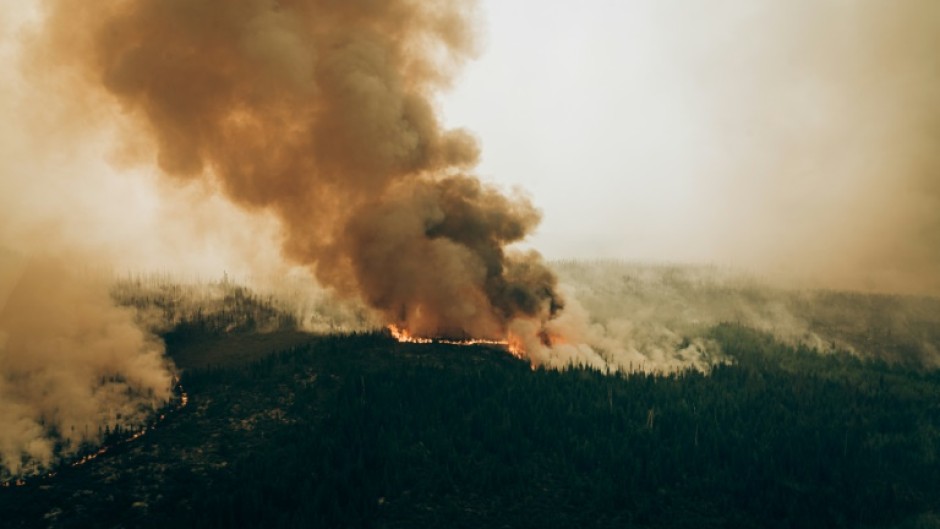PARIS - Earth has endured 12 consecutive months of temperatures 1.5C hotter than the pre-industrial era for the first time on record, Europe's climate monitor said Thursday, in what scientists called a "warning to humanity".
Storms, drought and fire have lashed the planet as climate change -- supercharged by the naturally-occurring El Nino weather phenomenon -- stoked record warming in 2023, making it likely the hottest in 100,000 years.
The extremes have continued into 2024, Copernicus Climate Change Service (C3S) service said, confirming that February 2023 to January 2024 saw warming of 1.52 degrees Celsius above the 19th century benchmark.
That is an alarming foretaste of future impacts even if global warming can be capped at the Paris climate deal's crucial 1.5C threshold, scientists said. It also underscores the urgent need to reduce planet-heating emissions.
But it does not signal a permanent breach of the limit, which is measured over decades.
"We are touching 1.5C and we see the cost -- the social costs and economic costs," said Johan Rockstrom, of the Potsdam Institute for Climate Impact Research.
"1.5 is a very big number and it hurts us really badly in terms of heat waves, droughts, floods, reinforced storms, water scarcity across the entire world. That is what 2023 has taught us."

Recent months have seen a global onslaught of extremes, including devastating drought gripping the Amazon basin, sweltering winter temperatures in parts of southern Europe and deadly wildfires in Canada and South America.
"It is clearly a warning to humanity that we are moving faster than expected towards the agreed upon 1.5C limit," Rockstrom told AFP.
He said temperatures will likely fall back somewhat after the El Nino ends in coming months, but added: "we're very, very close to a longer term breach."
The UN's IPCC climate panel had already warned that the world will likely crash through 1.5C in the early 2030s.
Planet-heating emissions, mainly from the burning of fossil fuels, have risen in recent years, even as scientists say they need to fall by almost half this decade.
"Rapid reductions in greenhouse gas emissions are the only way to stop global temperatures increasing," said Samantha Burgess, C3S deputy director.
- 'Off the charts' -
Scientists have increasingly warned that impacts accelerate with every fraction of a degree of warming.
At just under 1.2C of warming so far, the world today has already seen a crescendo of destructive extreme weather. The most vulnerable populations have already been hit hardest.
Breaching 1.5C could signal extinctions on land and in the oceans, crop failures, and the triggering of so-called "tipping points" in the climate system, including the death of biodiversity-rich coral reefs and irreversible melting of the polar ice sheets feeding sea level rise, experts say.
Tim Lenton, an Earth system scientist at the University of Exeter, said temperatures are spiking higher than he would expect from El Nino amplifying the underlying global warming.
"This clearly is putting some elements of the climate system at greater risk of tipping -- for example we saw an extraordinary area of the Canadian boreal forests burning last year, and we saw drought afflicting even what is usually the wettest (northern) part of the Amazon," he told AFP.
Scientists are concerned that the Amazon basin -- beyond a certain level of warming -- could rapidly transition into a savannah-like state.
Copernicus said January was the eighth record-breaking month in a row, with temperatures 1.66C warmer overall than the January average for 1850-1900 reference period.

While parts of the world experienced an unusually wet January, swathes of North America, the Horn of Africa and the Arabian Peninsula saw drier conditions.
In Chile, which has struggled with a brutal summer heatwave and drought, the dry conditions have stoked out-of-control wildfires, Copernicus said.
Those conditions have continued into February, with fires that started on Friday whipping into a deadly inferno in the coastal Valparaiso region over the weekend leaving more than 130 people dead.
The El Nino, which warms the sea surface in the southern Pacific leading to hotter weather globally, has begun to weaken in the equatorial Pacific, Copernicus said.
Meanwhile, sea surface temperatures have continued to smash records.
Rockstrom said 2023 "is a year where ocean dynamics have simply gone berserk, it's off the charts".
Oceans cover 70 percent of the planet and have kept the Earth's surface liveable by absorbing 90 percent of the excess heat produced by the carbon pollution from human activity since the dawn of the industrial age.
Hotter oceans mean more moisture in the atmosphere, leading to increasingly erratic weather, like fierce winds and powerful rain.
By Kelly Macnamara

